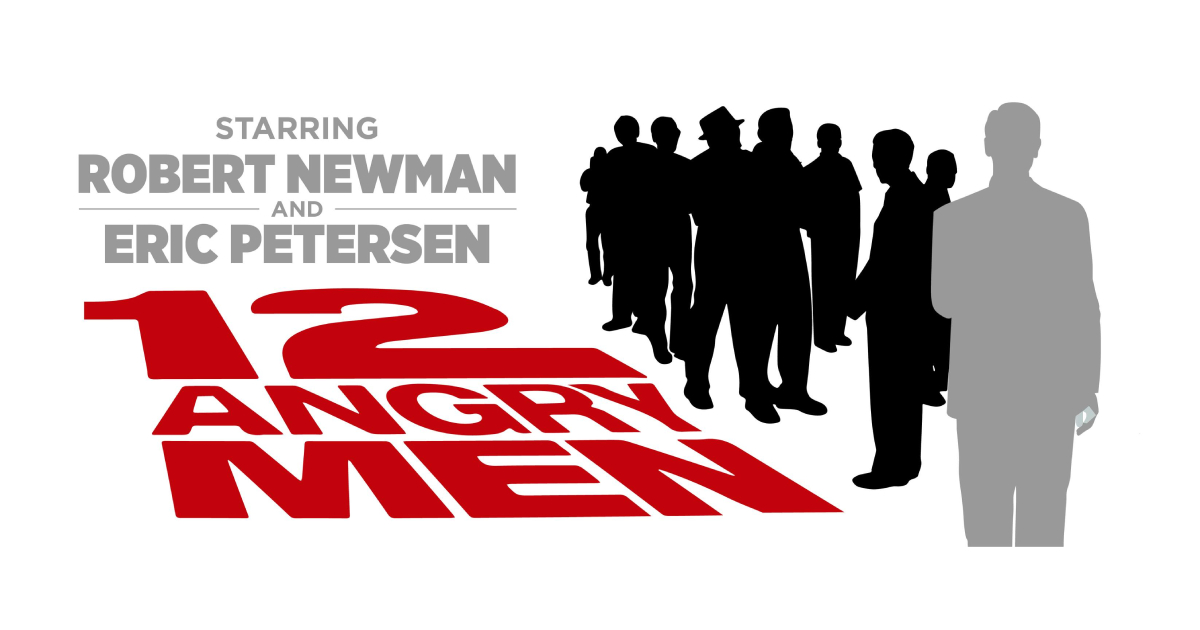“It’s very hard to keep personal prejudice out of a thing like this,” says righteous Juror #8 in the stage production of 12 Angry Men that opened The Barn Theatre’s 79th season. “Wherever you find it, prejudice obscures the truth.”
It’s the hottest day of 1954 in New York City with no AC and a broken fan when a jury of 12 white men start peeling off their sport jackets and loosening their ties because one of them isn’t willing to send a 16-year-old to the electric chair so the jurors can quickly move on with their lives after the three-day trial and stop being inconvenienced.
So begins everyone’s education amid a courtroom drama so well written and so well acted it has the audience, at turns, on the edge of their seats and sniffling to hold back tears.
Director Brendan Ragotzy is a natural storyteller and with a terrific cast of character actors and a now classic text, this 12 Angry Men is powerful theatre, largely unadorned.
Though the simple set designed by Brendan Ragotzy, lights by Noah Vos, sound by Troy Benton, and costumes by Sidra Sundberg all effectively create the conditions for this gripping tale to unfold.
This period piece is of its time, full of post-World War II idealism, an adaptation written by Reginald Rose of his popular television and film drama from the 1950s that finally made it to Broadway in 2004 with many other stage adaptations, including a musical in recent years. But it comes across with a special poignancy today as it explores questions of truth, bigotry, minority mindset, and illustrates how, fundamentally, the systems of democracy and justice do, actually, work in this country. Ultimately, the message is one of hope.
There are so many questions here that must be pondered—so many, in fact, that the jurors, led by Juror #8, played affectingly by Robert Newman, retry the case in their deliberations. Did the old man hear what he thought he heard or is there a deeper psychological reason why he may have come forward? Could the neighbor lady have actually seen what she thought she saw—through train windows and without her glasses on? Is it possible for a shorter kid to have stabbed his taller father from above with a switchblade?
These are the kinds of questions that bring “reasonable doubt”, that largely undefined term, into focus, that show that what may appear to be facts could be refuted. If the defense attorney were doing his job. But was he?
And what kind of shot does an inner-city kid with an awfully rough start really have in the world?
What’s equally fascinating is how each of the 12 jurors interacts with the facts, the questions, each other, and how they reveal themselves and their surprising diversity through their attitudes and beliefs, sometimes including how they can change.
The script is clever in that it never names the jurors, the defendant’s race, or the European watchmaker’s religion, giving the audience an opportunity to identify and scrutinize their own prejudices.
And this particular production is so gripping largely because of its strong cast. In addition to Robert Newman who creates chaos but also offers the calm, steady center of the drama as Juror #8, Robin Nuyen is moving as the doddering old man who offers hard-earned insight into the trial’s witnesses no one had considered. Eddie Doerr’s furious bigotry strikes a fevered pitch and then has nowhere to go, and steadier, more commanding speeches and arguments come from Charlie King as the watchmaker stumping for democracy, and Joe Pehrson as a man who grew up as a boy in a similar neighborhood to the one the defendant is from.
Other notable performances include Patrick Hunter who offers some comic relief as an amiable, flip-flopping, ad man; Luke Ragotzy as the foreman, a warm mediator who reveals his skills as a high school football coach; and Kyle Lowry as a gum-smacking baseball fan who is determined not to forfeit his tickets to the Yankees game.
Eric Petersen is outstanding as the juror with perhaps the highest stakes in the room, a seemingly hateful blowhard who, little by little, almost unwittingly reveals his vulnerability and grief as a father estranged from his own son, but is blinded by it. His performance inspires deep feelings of every ilk. It’s a heartbreaker.
But therein lies the hope. If he can be cracked open then there’s room for doubt as well as truth—amid the inevitable prejudices. On The Barn stage, of course, but also as a mirror for our world.
12 Angry Men
The Barn Theatre
June 3-8
barntheatreschool.org





